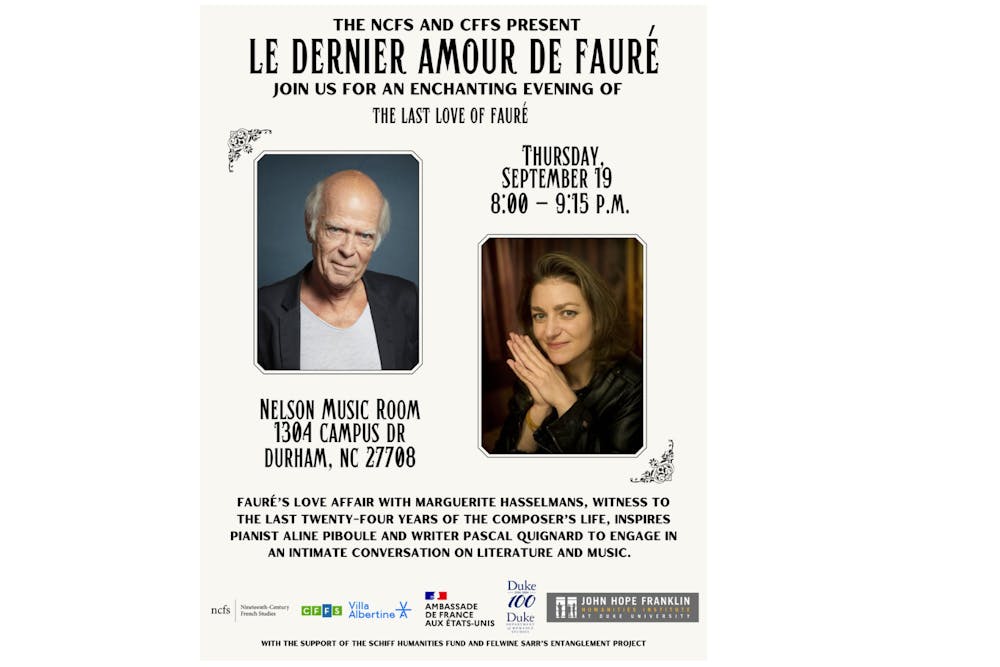In partnership with La Maison Française at New York University, the Department of French and Italian Studies at Princeton University, Conservatoire National Supérieur de Musique et de Danse and the French Government, Duke’s Arts and Cultural Citizenship Initiative and Bass Connections are launching the premier event of the Gabriel Fauré Centenary. Fauré was an influential composer, organist, pianist and scholar from the 19th and early 20th centuries who was known for his innovative harmonic and melodic techniques.
The event is called Le Dernier Amour de Fauré (trans: The Last Love of Fauré) and will take place Thursday, Sept. 19 in the Nelson Music Room from 8 p.m. to 9:15 p.m, with free admission. However, the limited seats are allocated on a first-come, first-serve basis.
“[The initiative] is multi-faceted … It is not only a performance … It’s also a symposium, it’s also masterclasses and discussion,” said Dr. Anne-Gaëlle Saliot when speaking on the international collaboration. The event coincides with the 19th Century French and Francophone Studies Colloquium, which will bring 240 academics to Duke.
The event will begin with a performance of Fauré’s later works by award-winning French pianist Aline Piboule. Piboule has a particular affinity for Fauré’s music, having recently released several recordings of his work, and has a history of working on interdisciplinary collaborations like this one. Specifically Piboule will play “Improvisation,” an extract from “Huit pièces brèves”; “Barcarolle no. 13”; “Thème et variations,” nos. 6 and 9; “Nocturne no. 11”; “Nocturne no. 12”; “Barcarolle no. 9”; “Barcarolle no. 10”; “Thème et variations no. 8”; “Barcarolle no. 12”; and “Nocturne no. 13.”
These works were composed during Fauré's relationship with pianist Marguerite Hasselmans, who Fauré relied on for feedback as he became increasingly deaf towards the end of his life. His faith in her ears and understanding of his style belies the depth of their relationship. Subsequently, Hasselman’s influence as companion and musician in her own right is evident in Fauré’s later works.
Following Piboule’s performance on Thursday, acclaimed French writer Pascal Quignard will be leading a conversation on literature and music. He will be speaking in French, but actress Amanda Gann will translate for the audience. Gabriel Richard, Anne-Gaëlle Saliot and Felwine Sarr from Duke’s Department of Romance Studies will be joining him.
Quignard is widely considered a leading voice in contemporary French literature and “it’s a great honor to be welcoming him,” said Dr. Saliot on behalf of the Romance Studies Department. Quignard is known for his acclaim as a writer but also for his lifelong relationship to music, having founded the Festival d’Opéra et de Théâtre Baroque de Versailles. The writer will be reading, in French, an unpublished text covering Fauré’s last decades and his relationship with Hasselmans.
More specifically, the text concerns “the ways in which these two people have had a constant dialogue about music … but it’s also about having a companion, having a relationship that evolves with time and having a relationship which is also one that is musical, artistic and intellectual,” said Dr. Saliot. There will be an English version provided, translated by Gann.
While the event is centered around Fauré, the conversation will use his music and legacy as a springboard for a greater conversation about literature, music, and their interdisciplinary relationship, as well as love and time.
For those with a more casual appreciation for music — or even those who have never heard of Fauré — attendance is still highly encouraged. “Towards the end of [Fauré’s] life, he was becoming increasingly deaf, one could notice a change in his approach to temporality, and of course time is the essence of music…and that radical change could be felt in his composition,” said Gabriel Richard in French, and translated by Dr. Saliot.
This emphasis on subjective rather than chronological time in the composer’s late stage lends a singularity to Fauré as a musician. His compositions do not have Wagner’s elaborate passion or Debussy’s chiaroscuro effect, but instead a softness that thrums close to the stuff of life.
Despite being overlooked in favor of his contemporaries, Fauré is vitally important musically but also philosophically. Le Dernier Amour de Fauré offers arguably one of the best introductions in demonstrating why.
Pianist Aline Piboule and writer Pascal Quignard will be performing and conversing on music and literature at Le Dernier Amour de Fauré Thursday, Sept. 19 in the Nelson Music Room from 8 p.m. to 9:15 p.m.
Get The Chronicle straight to your inbox
Sign up for our weekly newsletter. Cancel at any time.

